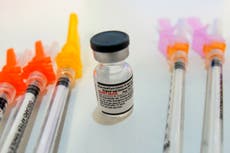The Independent's journalism is supported by our readers. When you purchase through links on our site, we may earn commission.
Severe Covid infections ‘can harm key brain functions’, study finds
Researchers hope findings can help identify best treatments for neurological symptoms of coronavirus

Your support helps us to tell the story
From reproductive rights to climate change to Big Tech, The Independent is on the ground when the story is developing. Whether it's investigating the financials of Elon Musk's pro-Trump PAC or producing our latest documentary, 'The A Word', which shines a light on the American women fighting for reproductive rights, we know how important it is to parse out the facts from the messaging.
At such a critical moment in US history, we need reporters on the ground. Your donation allows us to keep sending journalists to speak to both sides of the story.
The Independent is trusted by Americans across the entire political spectrum. And unlike many other quality news outlets, we choose not to lock Americans out of our reporting and analysis with paywalls. We believe quality journalism should be available to everyone, paid for by those who can afford it.
Your support makes all the difference.Covid infections can cause damage to essential brain functions that regulate memory and thought processes, researchers have found.
Kings College London scientists exposed brain cells to blood from patients suffering delirium in a bid to find out how Covid impacts neurological processes.
They took the cells from the hippocampus - an area of the brain key to cognitive, memory and learning skills - and assessed how they were affected by contact with the serum from infected patients.
The researchers found an increase in cell death, as well as a “profound reduction” in the generation of new brain cells - an essential process that maintains intact brain functions including memory and thought processes.
The study provides insight into what mechanisms could be behind delirium in Covid patients, as well as the general effects of the infection on the brain.
Have you been affected by this study? Get in touch with zoe.tidman@independent.co.uk
This could help to guide potential treatments to reduce symptoms of confusion, disorientation and memory loss in Covid patients, according to KCL.
Between 20 to 30 per cent of Covid patients tend to develop neurological symptoms such as delirium, rising to between 60 to 70 per cent in cases of severe illness, scientists have previously found.
“More and more, research is indicating that there is a neurological element to severe Covid-19 infection, but we have little understanding about what happens in the brain to produce these symptoms,” the lead author of the new study, Dr Alessandra Borsin, said.
She said the research was the first to use blood samples from Covid patients with delirium to look at how the infection affects neurogeneis, or the generation of new brain cells.
“We have found that there is a profound reduction in the generation of new brain cells and an increase in cell death, and these are likely mechanisms behind delirium, and possibly other neurological symptoms, in Covid-19 patients,” Dr Borsin from KCL’s Institute of Psychiatry, Psychology amd Neuroscience said.
The development of neurological symptoms is likely to involve an overactive immune response to a Covid infection and an excess production of inflammatory proteins - known as cytokines - which can move into the brain.
The research looks at the key role these cytokines play in impacting brain mechanisms.
“The role of inflammation and our immune response in Covid-19 infection is well-known, but research like ours is now revealing how it affects our brain, our thinking and our mental health,” Professor Carmine Pariante said.
“Through a series of tests, we have shown that it is likely that the initial production of cytokine proteins as part of the inflammatory response in Covid-19 infection triggers a cascade of other cytokines which reduce generation of new brain cells and increase cell death, leading to brain symptoms such as delirium.”
The study author added: “These neurological symptoms are very concerning for patients and their families, and the hope is that our research can help identify which treatments would be most appropriate to lessen or prevent these symptoms.”
The study has been published in the journal Molecular Psychiatry.






Join our commenting forum
Join thought-provoking conversations, follow other Independent readers and see their replies
Comments